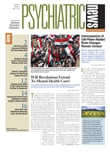As many of you know, Archbishop Desmond Tutu will be the Convocation speaker at this year's APA annual meeting in Hawaii. His selection has been the source of some controversy. I wanted to briefly address the concerns that have been raised, but first some comments about who this man is and what he stands for.
The Archbishop is an internationally renowned figure who has been the recipient of multiple honors, including the Nobel Peace prize, the Albert Schweitzer Prize for Humanitarianism, the Gandhi Peace Prize, and the U.S. Presidential Medal of Freedom. He was a leading figure in the anti-apartheid movement in South Africa, helping to prevent genocide in a country where few thought a bloodbath could be avoided. In February 2010, as keynote speaker at the American College of Psychiatrists meeting, he described the truth and reconciliation process in South Africa.
His message is simple, yet powerful: we are fundamentally good. It is difficult to capture in words just how inspiring and uplifting he was—able to communicate the resilience and potential of the human spirit in an extraordinary yet humble way. I learned that a dear friend and medical school classmate had been instrumental in arranging for the Archbishop to come to the college, and she was able to assist me in approaching him to be the Convocation speaker for the Hawaii annual meeting.
APA was most fortunate to have formalized its speaker contract with Archbishop Tutu in April 2010. We were able to publicize his appearance to attendees at APA's annual meeting in New Orleans during which there was an early registration period for this year's annual meeting and during the regular "early bird" registration period beginning in November. The publicity helped achieve a robust response to those registration calls.
In September, I became aware that a very small group of our members were upset at the selection of Archbishop Tutu, believing him to be "anti-Semitic" because of statements he had made regarding the treatment of Palestinian refugees by the Israeli government. I spoke with some of these members privately at the time and publicly in November at the Assembly meeting, where I explained the process behind my choice and my belief that he had much to offer in his comments about the truth and reconciliation process in South Africa that would be of interest to our members and their guests at the Convocation.
Unfortunately, some were not satisfied with my explanation and have mounted an intensive campaign in Psychiatric Times and with some Jewish organizations in the United States to demand that I rescind the invitation. A few others have threatened to boycott the meeting, resign from APA, and/or engage in protests. These efforts have recently been headlined in Psychiatric Times, which is a privately funded monthly paper not connected to APA. My personal e-mails to members have been taken out of context, as have many of the Archbishop's comments. No one with whom I have spoken about their dissatisfaction with my choice had ever heard the Archbishop speak. It has been extremely distressing to me personally as well as a sad commentary on how electronic communication technology—which makes it easy to "cut and paste" selected portions of e-mails and online text and forward them virally—can be used for distortion and ill will as much as it can be used on behalf of humanity.
Here are some comments from the Archbishop from his original address regarding the conflict in the Middle East that appeared in the Guardian on April 29, 2002:
"In our struggle against apartheid, the great supporters were Jewish people. They instinctively had to be on the side of the disenfranchised, of the voiceless ones, fighting injustice, oppression, and evil. I have continued to feel strongly with the Jews. I am a patron of the Holocaust Centre in South Africa. I believe Israel has a right to secure borders … . Israel will never get true security and safety through oppressing another people. A true peace can ultimately be built only on justice. We condemn the violence of suicide bombers, and we condemn the corruption of young minds taught hatred; but we also condemn the violence of military incursions in the occupied lands and the inhumanity that won't let ambulances reach the injured." (See <
www.guardian.co.uk/world/2002/apr/29/comment>.)
Condemning violence is not equivalent to anti-Semitism. Further, APA is not a political organization, and Archbishop Tutu will not be speaking at the APA annual meeting in a political context. We take great pride in our deep and abiding commitment to free speech and the sharing of ideas. I fully respect the rights of those who wish not to attend either the meeting or this particular event. However, I hope that you will join me in this extraordinary opportunity to learn about the truth and reconciliation process in South Africa and how a nation bitterly divided has come together to conquer centuries of distrust, conflict, and hatred.

